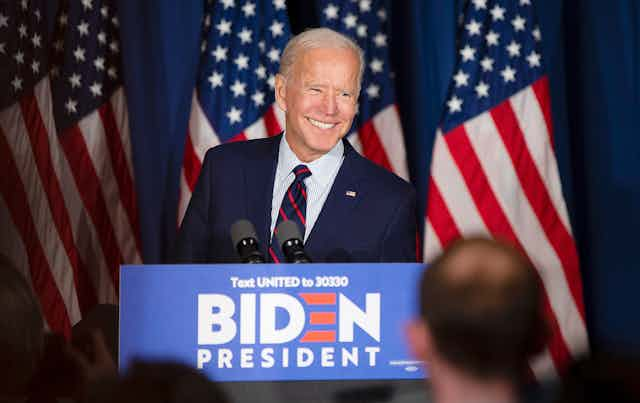Hopes are high in the European Union that Joe Biden will rapidly get to work on a substantive global “to-do” list when he takes over as US president in January. This includes a renewed commitment to multilateralism and specific assurances on NATO and the UN – plus re-entry to the Paris Climate Agreement and the Iranian nuclear accord.
EU officials were quick to congratulate Biden, confident of being able to work more positively with him than with Trump. From the EU’s perspective, Trump has proved contentious at best and obstructive at worst. He has made life difficult in virtually every policy area, from security to climate change.
Anti-establishment politicians in Hungary, Poland, Italy will miss the master of “megaphone diplomacy” – and populist trends on either side of the Atlantic are not likely to disappear overnight – but the majority of EU leaders are likely to work fruitfully with the Biden administration.
Biden, too, appears keen to repair America’s reputation globally. But in doing so, he may use the opportunity to renegotiate some key terms. He may want to discuss NATO’s budget and have terms for re-engaging with the Paris Climate Agreement, the World Trade Organization and the World Health Organization. These are all matters of great important to Europe.
In his own words, Biden is determined to “elevate diplomacy as the United States’ principal tool of foreign policy”. Some of his suggestions to “place the United States back at the head of the table”, working with allies, are likely to go down well. The EU in particular will be supportive of Biden’s determination to host a global democracy summit, and to push back against authoritarianism and corruption, while advancing human rights.
Other goals may find fewer fans, including a “foreign policy for the middle class”. This concept is based on restoring the US’ lead in the global economy, itself predicated on talking tough on tariffs with China and possibly the EU.
In terms of an EU reset, however, the tone is positive. European Commission president Ursula von der Leyen has already spoken of a “renewed partnership” between the two sides when congratulating Biden on his result.
German chancellor Angela Merkel and French president Emmanuel Macron are also poised to enjoy warmer bilateral relations as well as improved attitudes regarding NATO’s development. For Macron and Merkel in particular, a Biden presidency promises not only renewed support for multilateralism in general but specific attention to precisely how the EU-US partnership can make headway on key global goals, including climate change.
It is the Republic of Ireland, however, that may benefit the most from the change in administration. Biden has spoken frequently and proudly of his Irish roots and publicly lamented Brexit’s various impacts, from concerns over the Good Friday Agreement to broader European relations with the UK. Ireland may therefore find itself in a unique position as Brexit interlocutor between the White House, the UK and the EU, replacing the bridge-building role that the UK has traditionally held.
Johnson’s ‘special’ relationship
Biden’s election is also a welcome development for EU officials in Brussels. They hope he will put real pressure on the UK government to strike a deal swiftly with the EU, and then reset UK-EU relations. Both demands will be a challenge for the UK.
A series of personal tensions and political antipathies could undermine initial attempts to jump start the US-UK “special relationship” under Biden. Missteps by UK prime minister Boris Johnson, including rudeness about former president Barack Obama and former secretary of state Hillary Clinton, will not endear him to the new president.

More importantly, Trump was a vocal supporter of Johnson and an enthusiast for both Brexit and pro-Brexit parties. Johnson routinely and publicly returned the favour, remaining largely supportive of Trump, albeit not of all of his policies. In the closing stages of the election campaign, Biden made clear that US attitudes to the UK rely almost entirely on two things.
First, the UK’s ability to build bridges with the EU, both diplomatically and through trade. While Trump and Johnson shared a deep-seated aversion to the EU, Biden “deeply regrets the UK’s exit from the EU”.
Second, a more judicious handling of the Irish border question. While recent and highly contentious changes by the British government to the agreed EU-UK withdrawal agreement went largely unnoticed by the Trump administration, the potential impact on the Good Friday Agreement was a matter of real concern for Biden and the Democrats alike. A UK deal with the EU – albeit a thin one – is ultimately on the cards. But to win Biden’s trust, Johnson will need to overcome deep-seated distrust with the new US administration.
For 2021, talk of US trade deals – itself possibly premature – will likely be tilted towards the EU rather than the UK. Common ground will have to be found elsewhere. Happily, the UK has three prime opportunities in 2021 to provide serious leadership on the world stage alongside the US. These include the the rotating presidency of the UN Security Council in February, hosting the delayed COP26 UN climate summit in November, and the rotating G7 presidency for all of 2021.
All three are excellent forums in which the UK can relaunch its own post-Brexit foreign policy goals while simultaneously supporting Biden’s objectives “of renewing alliances between democracies, strengthening international institutions within the UN and taking action on climate change”.
International relations are overdue a period of stability. It’s up to Johnson to establish his post-Brexit diplomatic credentials and to build a new set of relations with the US – and it’s up to all his European counterparts to work alongside Biden in getting to work on the global to-do list.

